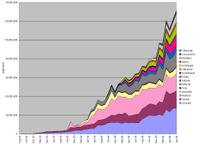AT&T is terribly jealous of how Comcast has all that bandwidth and can just run roughshod over network neutrality, treating it the way T does cellular.
Of course, Comcast is a cable operation. It’s not a phone company. But what’s the difference, really? Both Comcast and AT&T run wires into the home. Both offer (or will soon offer, once AT&T gets its TV ducks in a row) the same mix of services. The difference is that Comcast can sell more of them — its pipe is bigger.
But that’s not really what galls.
What galls is how Comcast, by treating what’s essentially a branded Internet service as "interactive TV," can control the distribution and content of what individuals do, and pocket all the money, too. Without a peep from the digerati.
All it has to do is call the resulting agreement a "video on demand" offering, or an "interactive TV" thing.
Here’s one new example, a deal with Facebook to launch "video diaries." The diaries are created online, they take an awful lot of work to make, and Comcast takes all the money — not all the profit, all the money.
Here’s another. Comcast dealing with rap heavyweights Sean Coombs and Jay-Z on an "urban video on demand" launch.
All these things are two-way digital, delivered on the same type of platform AT&T is building. Comcast carves off a single channel on its massive system for real Internet service, but 99% of the bandwidth that could be Internet service is being filled with Comcast-controlled crap.
And no one utters a peep about it.
Now there is a difference. AT&T has immense market share in the
Internet core, thanks to its purchase of AT&T’s old longlines
network. By putting Cisco gear into that core, gear that can tell what
everyone’s bits are doing, AT&T has the power to speed or slow
service to all Internet customers, from the core, based on its whims
and self-interest. (The government likes this gear because it makes
spying easier.)
Comcast’s network doesn’t work that way. It’s only connected to the
Internet via those tiny channels it offers as cable modem service.
Everything else is a private network. It’s TV, right?
But digital TV and digital voice and digital digits are all digital services, ones and zeros.
The fact is that if we demanded that Comcast and AT&T hand over
more bits to the Internet, service levels would immediately improve
dramatically, without a dime having to be invested for fiber or
anything else.
Maybe we should do that. Tell Comcast to take its Interactive TV and
shove it. Give me the bits and let me do with them as I will.












